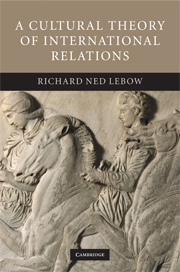Book contents
- Frontmatter
- Contents
- List of figures and tables
- Acknowledgments
- 1 Introduction
- 2 Fear, interest and honor
- 3 The spirit and its expression
- 4 The ancient world
- 5 Medieval Europe
- 6 From Sun King to Revolution
- 7 Imperialism and World War I
- 8 World War II
- 9 Hitler to Bush and beyond
- 10 General findings and conclusions
- Bibliography
- Index
2 - Fear, interest and honor
Published online by Cambridge University Press: 03 July 2009
- Frontmatter
- Contents
- List of figures and tables
- Acknowledgments
- 1 Introduction
- 2 Fear, interest and honor
- 3 The spirit and its expression
- 4 The ancient world
- 5 Medieval Europe
- 6 From Sun King to Revolution
- 7 Imperialism and World War I
- 8 World War II
- 9 Hitler to Bush and beyond
- 10 General findings and conclusions
- Bibliography
- Index
Summary
And the nature of the case first compelled us to advance our empire to its present height; fear being our principal motive, though honor and interest afterwards came in.
Athenian speakers to the Spartan assemblyPolitical scientists have rightly been accused of “physics envy.” I do not want to open myself up to the charge of “polis envy.” I do, however, want to go back to the Greeks and their thoughts about politics for the conceptual foundations of my theory. I recognize that the Greeks of the classical period lived in a very different world, where the city state (polis) was the principal unit and source of identity, and where politics, and all important relationships, were conducted face to face among people long acquainted with one another. Democracy, where it existed, was direct, with most or all important issues being debated and voted on in public assemblies. Politics was entirely the preserve of adult male citizens, and the criteria for citizenship, even in Athens, were extremely restrictive. Women, children, slaves and resident aliens performed, at most, ceremonial roles.
Despite these striking differences, the great playwrights and political thinkers of classical Greece still speak to us and their writings remain the starting point of our reflections on a wide range of ethical and political issues. Thucydides (460–c. 390 BCE), Plato (427–347 BCE) and Aristotle (384–322 BCE) provide the foundations for theories of politics and international relations. Their insights are timeless, but only in part due to their indisputable genius.
- Type
- Chapter
- Information
- A Cultural Theory of International Relations , pp. 43 - 121Publisher: Cambridge University PressPrint publication year: 2008
- 1
- Cited by



